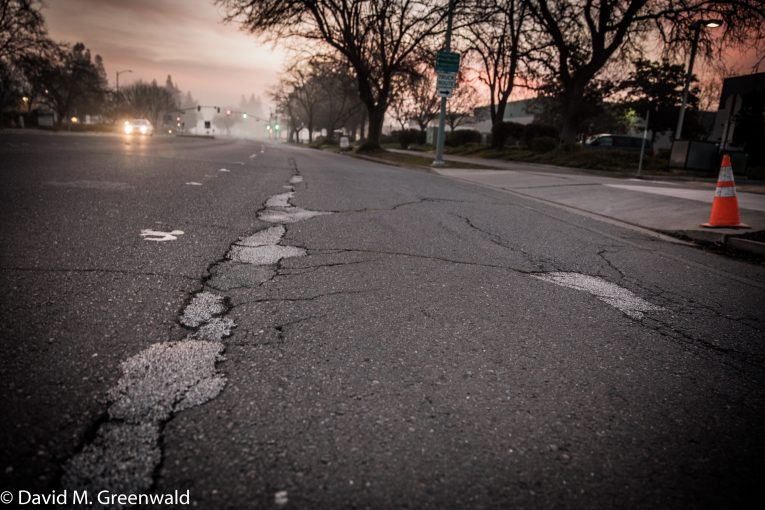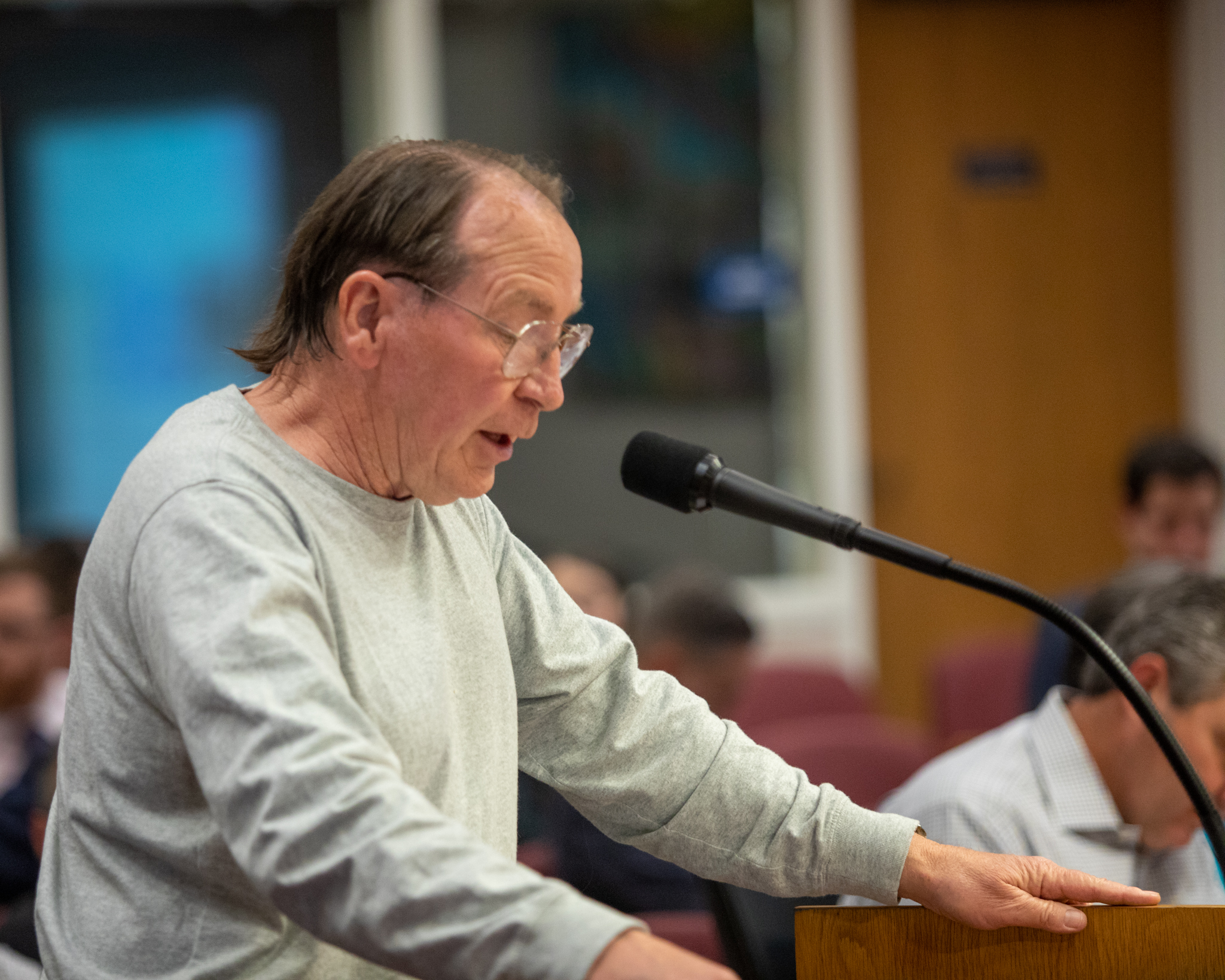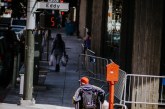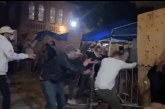

Meanwhile our Major Arterial Roadways Deteriorate into 3rd-World Condition
by Alan Pryor
The following email was sent to the Davis City Council prior to last Tuesday’s Council tele-meeting requesting that SB1 gas tax monies be only spent on main arterial roadway repairs in Davis because budgetary shortfalls will probably eliminate other needed roadway repairs of these critical main roadways and streets in Davis. The email was in response to a posted Consent Calendar item in which Council was asked by Staff to approve sending their proposed “wish-list”of neighborhood streets to be repaired in FY 2020-21 to the state as a pre-condition to receiving $1.3 million in SB1 gas tax monies for such repairs.
The list of streets to be repaired was prepared solely by the City’s Public Works Department and not ever vetted by the Bicycle, Transportation, and Street Safety Commission (BT&SSC) nor by the Finance and Budget Commission (F&BC) nor was there any indication in Staff’s Report that these streets selected were in any worse state of disrepair than other neighborhood streets or major arterial roadways in town. It was simply a wish-list put together by Staff and there was no way of knowing if there was any quantitative basis for their selections.
Further, since the list to be sent to the State was not due until May 1, there was ample time for the consideration of the list of selected streets for repair by the appropriate Commissions prior to the submission deadline.
I objected to this arbitrary process in my following email but my request fell on deaf ears as the Council unanimously approved Staff’s recommendation without comment or discussion.
Subject: Please Pull the Consent Calendar Item on Street Rehabilitation Selection for SB1 Financing
Date: Tue, 24 Mar 2020 2:18:32 PM
From: Alan Pryor <ozone21@att.net>
To: Brett Lee <blee@cityofdavis.org>, Lucas Frerichs <lfrerichs@cityofdavis.org>, City Council
<CityCouncilMembers@cityofdavis.org>, Will Arnold <warnold@cityofdavis.org>, Dan
Carson <dcarson@cityofdavis.org>, Gloria Partida <gpartida@cityofdavis.org>
Re: Council Risks Squandering SB1 Gas Tax Monies on “Nice-to-Have” Projects
Dear Councilmembers –
On tonight’s City Council tele-conference meeting agenda there is a Consent Calendar Item (“Recommended Projects for SBI Road Repair and Accountability Act: Local Streets and Roads Funding for City of Davis“) in which the City proposes to submit a number of local projects to the State for funding through the SB1 tax collected on gas sales in the State.
I respectfully request Council pull this item from the Consent Calendar until the selected streets have undergone review by the BT&SSC according to quantitative and objective selection criteria. This information should also be posted n the City’s website and available for informed Council and public review.
Let me explain
According to the Staff Report to Council , “Senate Bill 1 (SB1), the Road Repair and Accountability Act, provides revenue for funding projects in the City of Davis to improve local streets and roads, bridges, and increase mobility options through walking, biking, and transit infrastructure. These funds will be allocated to the City of Davis for local transportation projects.”
“SB 1 was passed in early 2017 by the state legislature and provides funding to fix and maintain our local streets, roads and bridges. This legislation requires local agencies, prior to receiving funds, to annually submit a list of projects proposed to be funded with Road Maintenance and Rehabilitation Account (RMRA) funds to the California Transportation Commission (CTC).
May 1, 2020 is the due date for agencies to submit a report on planned expenditures in Fiscal Year 2020/21. The CTC will review the project lists to ensure they include statutorily required information to establish eligibility for funding (CTC does not “approve” projects/lists for funding).” (Emphasis Added)
Maps prepared by City Staff showing the proposed streets to be rehabilitated through SB1 funding are shown in the Staff Report found at http://documents.cityofdavis.org/Media/Default/Documents/PDF/CityCouncil/CouncilMeetings/Agendas/2020/2020-03-24/04E-SB-1-Funding-Proposed-Projects-List-FY-20-21.pdf
The proposed streets to be rehabilitated are spread throughout the City but notably concentrated
1) in West Davis just south of Covell on Denali;
2) in Old North Davis on D and E Streets between 5th and 8th Streets and a short sections on W. 8th St. 3) in East Davis extending from Pole Line along E. 8th St.;
4) extensively in East Davis is the neighborhood just east of Birch Lane School;
5) extensively in East Davis in the neighborhood north of 5th St. and west of Mace Ranch Park
Notably, there are no proposed rehabilitation projects at all in South Davis where many residents claim neighborhood streets have been intentionally neglected for years due to the lack of any Council members living there. Perhaps District elections might change this presumed oversight.
Unfortunately, there is absolutely no discussion at all in Staff’s Report as to the selection criteria used to pick the selected streets designated for rehabilitation which leaves many unanswered questions; including,
1) Are these selected neighborhood streets objectively in a more degraded state than others in the City?,
2) Do these selected neighborhood streets objectively carry more traffic given their objective status of disrepair than other streets in the City?,
3) Have these selected streets gone a longer period of time without rehabilitation than other comparable neighborhood streets in the City?,
4) Do these neighborhood streets play a critical role in the Safe Routes to School bicycle program and are they objectively in more need of repair than other Safe Routes to School neighborhood streets?
Unfortunately, Staff provides absolutely no guidance on this subject other than it was stated that these selected streets were otherwise scheduled for repair in the 20-21 fiscal year. Additionally, these recommended rehabilitation projects have never gone to the Bicycle, Transportation, and Street Safety Commission (BT&SSC) for review nor to the Finance and Budget Commission for consideration. For all the public and the Commissions know, the areas selected by Staff where chosen by the old dart and a dart board method.
More importantly, however, is the fact that the City will almost certainly face extreme budget shortfalls this year as a result of the Corona Virus crisis. As part of the City’s approximate $61,000,000 budget for FY 2019-2020, revenues of $16,226,000 are expected from sales and use taxes levied and collected in the City. Many pundits expect this to fall by a minimum of 50% and possibly 75% on an annualized basis during the duration of the current ongoing Corona Virus crisis. This could result in an annual shortage of as much as $8,000,000 to $12,000,000 if the economic damage is extended for a year into the future. This would be disastrous for the City government’s economic well-being.
These shortfalls, if they materialize, may cause unavoidable cash shortages in the Capital Improvement budget for the City causing other planned rehabilitation of major arterial roadways (i.e. the “need-to-have” street rehabilitation projects) to be canceled if General Fund monies are not available as anticipated before the Corona Virus crisis fell upon us. A more prudent approach would be for the City to plan to use SB1 road tax revenues for major arterial roadway repairs and IF the budget shortfall is not as severe as might be expected and more capital improvement monies do prove to be available, then available capital could be allocated for these “nice-to-have” neighborhood street rehabilitation project.
In any event, the report is not due to the State specifying which projects are going to be funded in FY 2020-21 by the SB1 monies until May 1 according to Staff. Thus, there is still plenty of time for appropriate Commissions to review the selection criteria and resultant projects selected by the City for SB1 funding to ensure the best transportation interests of the residents of Davis are objectively considered.
Now is not the time to give free rein to Staff to arbitrarily select which streets get repaired and which languish unless they have demonstrated they have an equitable and objective means for doing so.






It’s perhaps worth noting that the City has not had a senior level transportation engineer – a licensed civil engineer with a focus on and extensive experience in transportation, generally a department head, etc. – for close to three years. The top people in Public Works are a civil engineer and and a transportation planner. There’s a lot of knowledge there, but the City has never found a replacement for the former head who left in 2017. There was also a transfer of another civil engineer, superior the current head traffic planner, to another part of Public Works. They had or have a budget for one, at least one person of the desired experience level was very nearly hired but then dropped out, and sometime later a junior level was hired but then left within a few months (with no notice to the BTSSC, of which I am a member). Other civil engineers within Public Works have been tasked to manage individual projects.
I first expressed concern about the issue at my first BTSSC meeting in December 2017. Most recently I brought it up during a Council review of capital projects. I’ve always had to ask about the status; it’s never been offered. The full transportation team in Davis needs all its seats filled, from policy (Council and Commissions) to analysis, to design, to implementation… to communication. The BTSSC could not meet in February because it was short of quorum; how are we approving major and minor projects with missing actors, even as City policy seems to indicate that they’re needed? Perhaps we need to tighten up the policy.
On its face, that is extremely disturbing. I would be most open to a response by Council or staff explaining the criteria used, or why none was used. I am not myself accusing, but if true as written, a response is a necessity.
If we are going on with usual business, then we do need unusual accountability.
Alan M, in the last 35 years, staff has reported many times on how streets are evaluated and prioritized.
The author appears to have a ‘control’ issue.
I suspect one could find the info about which streets are prioritized in this 2015 report.
http://documents.cityofdavis.org/Media/Default/Documents/PDF/CityCouncil/CouncilMeetings/Agendas/20151201/08-Pavement-Management-2016-Update-Presentation.pdf
Bill,
It’s particularly depressing to see this form of attack on City Staff, amid suggestions that we have rogue staff members out pursuing their own narrow agendas.
More than depressing – it’s blatently offensive.
I don’t follow details of the BTSSC’s monthly agendas, but I do know they have steadfastly maintained a detail outline of future, planned improvements. The latest report, delivered to City Council in January, can be found here (http://documents.cityofdavis.org/Media/Default/Documents/PDF/CityCouncil/CouncilMeetings/Agendas/2020/2020-01-14/07-2019-Pavement-Management-Report.pdf).
While I haven’t read the report, I’m guessing these project are somewhere identified within this report and that the BTSSC has, at one time or another, reviewed Staff recommendations for their implementation. Maybe you want to talk to past City Councils or the Commission about the processes they took to prioritize and develop these lists.
If anything, Mr. Pryor’s comments would seem to clearly point out the absolute necessity of re-reviewing City program and expenditure priorities in light of recent events. Everyone needs to take a deep breath and reconsider what is essential from the non-essential. What we absolutely don’t need at this time is monday morning quarterbacking and recriminations over what could have been, should have been, and the like. And we absolutely don’t need this type of invective anywhere in the conversation.
Where we go from here is what’s important – taking care of our neighbors and the community’s day to day needs – while considering a reset of priorities as we plan for the future.
Stay safe and well.
For what it’s worth, the BTSSC did not have a pavement rebab prioritization item on our Regular Calendar in all of 2019. Certainly any actions were included in staff updates, and then likely only in the meeting agenda and not actually discussed during the meeting unless a Commissioner had a question.
Mr. Edelman:
Perhaps you could enlighten us as to the role of the Commission and Commission Chair in establishing, managing and prioritizing the monthly Agenda. Is the responsibility for priority setting vested in the City Council, City Staff or the Commission itself?
Good question Doby. I would also like to know if the Vanguard has reached out to the City to get comment.
As I understand it, all Commissions have a similar formula/process in bringing things to the monthly Agenda. It’s a dynamic mixture of efforts of the bodies you mention, with two more: The Commission Chair (or Vice-Chair) and the public.
I’ve been told that in some Commissions the Commissioners tend to make more decisions about Agenda content than in others. They lead more than Staff.
In the BTSSC – which I joined in December 2017 – and all Commissions there’s a long range calendar, similar to the one used by Council, but with a shorter menu. At the end of every meeting – just like with Council – we see what Council or Staff wants to add, we add what we can (if we agree on it) and we decide what gets shuffled around (delayed). Then probably around two weeks before the next meeting the Chair meets or talks with the Staff liaison to see if what was decided at the previous meeting works for the next one. Sometimes a new item is added, and often that’s something completely new to our Commission, which means that in the worst case we only have 72 hours to review it. To be clear, this is the exception, and most of the time Staff publishes the meeting agenda six days before the meeting.
The shuffling problem is, I feel, quite a big problem in our Commission. We have too much on our plate. That’s the starting point, rather than any conscious or unconscious bias or political pressure, though I’d asked the former Chair multiple times for some additional meetings to take up the backlog and never heard back. Items important to one or more Commissioners, which the rest have already agreed on seeing sometimes in a particular month, get delayed perpetually. This is not what I see on the Council agenda, where items sit on the LRC for a very long time; what happens is that items are scheduled for particular months, even following citizen input at our general public comments, but then pulled, and pulled over and over again. (The worst current example is a review of the officially-complete intersection redesign of E. Covell and L St. At the July 2019 meeting we assigned it to September 2019, and on the most recent LRC from the March 2020 meeting agenda* (this meeting was COVID-cancelled) it’s on the LRC as TBA!) Given the need to adapt meetings to COVID and the huge amount of things we’re supposed to look at, it feels like we might not see that item – the “Covell Blvd / L Street Intersection Review” – until a year after it was originally scheduled… following, I might add, testimony about the huge safety and inefficiency risks of the design by local cycling advocates in July 2019 and possibly earlier.)
* The March 2020 Agenda was sent to the Commission in PDF form, and a few days later the meeting was cancelled as mentioned. As it was cancelled, the Agenda was removed from the City website. As the Feburary meeting was also cancelled – in this case due to lack of quorum – the most recent visible Agenda and LRC is from January 2020. The unapproved minutes of the January meeting were in the “March packet” but were also removed with the rest of it. I don’t understand any formal reason for my agendas for cancelled meeting can’t still be broadcast public info (I can share the PDF version….).
Definition of invective:
https://www.lexico.com/definition/invective
Yeah, that’s about the most “insulting, abusive, and highly critical language” that I’ve ever heard on here. 😉
I find it ironic that somebody who has a history of opposing growth in the city, both residential and commercial, now wants to complain about how our limited dollars for street repair are allocated. If you want to understand why we don’t have money to fix our, worst in the county, roads a large part of the problem is lack of revenue to the city because of lack of growth.
Ponzi scheme, forever hoping that someone else will pay (e.g., on the backs of younger people). And, screw greenhouse gasses and sprawl, which consistently take a back seat in most places.
Exposed during times of financial/fiscal crises – even (or perhaps especially) in cities that rely upon the Ponzi scheme.
Alan’s right – now is the time to prioritize. The money isn’t going to be there – anyplace.
Ron O,
I guess it’s largely in the eye of the beholder, quoting from Mr. Pryor’s commentary (italics and bolding added):
Would it be better to call them “inaccurate”, “underinformed mis-statements”, “unwarranted conclusions”, “demeaning”, “disparaging”, and “deliberate mis-representations”.
I’m telling you how these mis-statements “strike me” and my “feelings about them”. And in context of typical Davis lexicon – I believe the term invective is an apt description.
[edited]
At least one council member has made statements that I’d probably describe as “invective”, as well. (As discussed yesterday, for example.)
Ultimately, focusing on that is a distraction, more than anything else. At times, used as a political weapon.
Perhaps the more important points in Alan’s article (some of which you’ve acknowledged) are what we should focus on.
In and of itself, allocation of funds via prioritization is very important. I understand why people are skeptical of the source of the argument – but a simple explanation could end this.